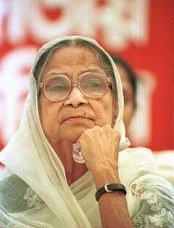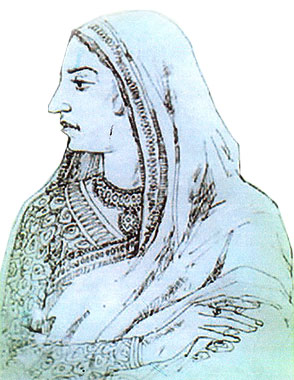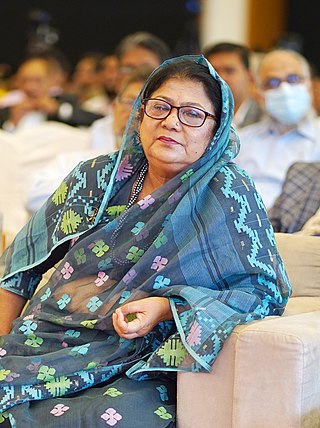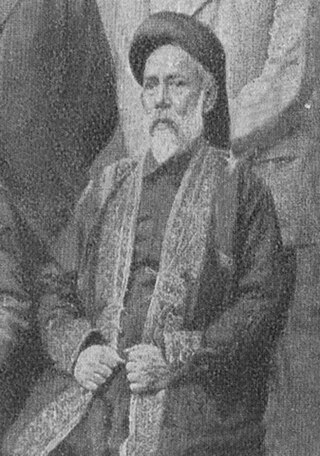
Rokeya Sakhawat Hossain, commonly known as Begum Rokeya, was a prominent Bengali feminist thinker, writer, educator and political activist from British India. She is widely regarded as a pioneer of women's liberation in Bangladesh and India.

Begum Sufia Kamal was a Bangladeshi poet, feminist leader, and political activist. She took part in the Bengali nationalist movement of the 1950s and civil society leader in independent Bangladesh. She led feminist activism and was a president of Bangladesh Mahila Parishad. She died in 1999 and was the first woman to be given a state funeral in Bangladesh.

Neelima Ibrahim was a Bangladeshi educationist, littérateur and social worker. She is well known for her scholarship on Bengali literature but even more so for her depiction of raped and tortured women in the 1971 Bangladesh Liberation War in her book Ami Birangana Bolchi. She was awarded Bangla Academy Literary Award in 1969, Begum Rokeya Padak in 1996 and Ekushey Padak in 2000 by the Government of Bangladesh for her contributions to Bangla literature.
Shamsunnahar Mahmud was a writer, politician and educator in Bengal during the early 20th century. She was a leader of the women's rights movement in Bengal pioneered by Begum Rokeya. Shamsunnahar Hall of the University of Dhaka and University of Chittagong was named after her.

According to the 2011 census, West Bengal has over 24.6 million Muslims, making up 27% of the state's population. The vast majority of Muslims in West Bengal are ethnic native Bengali Muslims, numbering around over 22 million and comprising 24.1% of the state population. There also exists an Immigrants Urdu-speaking Muslim community numbering 2.6 million, constituting 2.9% of the state population and mostly resides in Urban areas of the state.

Nawab Begum Faizunnesa Choudhurani was Zamindar of Homnabad-Pashchimgaon Estate in present-day Comilla District, Bangladesh. She is most famous for her campaign for female education and other social issues. In appreciation of her social work, in 1889 Queen Victoria awarded Faizunnesa the title of "Nawab", making her the first female Nawab in South Asia.
Raquibunnesa Mahmuda Khatun Siddiqua, also known by her daak naam Batashi, was a Bangladeshi poet, essayist, and a pioneering women's liberation activist. She was awarded Ekushey Padak in 1977 by the Government of Bangladesh.
Begum Rokeya Padak, named after Begum Rokeya, is a Bangladeshi national honour conferred on individual women for their exceptional achievement. The award is given by the Ministry of Women and Children Affairs of the Government of Bangladesh. First awarded in 1995, the Rokeya Padak recognises the pioneering contribution of an individual in empowering women and raising women's issues.

Hena Das was a Bangladeshi women's right activist and leftist. She was involved in Nankar Movement in 1948 and Bangladesh Liberation War in 1971. In 2001 she was awarded Begum Rokeya Padak by the Government of Bangladesh for empowering women and raising women's issues.
Begum is a Bengali-language monthly magazine founded in 1947. It was Bengal's first illustrated women's weekly. It covered the work of Bengali women in literary activities.

Begum Rokeya Day is the 9 December anniversary of the birth and death of Begum Rokeya, a Bengali writer, educationist, social activist, and advocate of women's rights. The day is organized and celebrated by schools, colleges and universities of Bangladesh, as well as the Bengali Government, as a tribute to her works and legacy. On that day, Bangladesh government confers Begum Rokeya Padak on individual women for their exceptional achievement.

Nurun Nahar Faizannesa was a Bangladeshi feminist and social activist. She was the first elected female member of the syndicate of the University of Dhaka and the National Pay Commission of Bangladesh.

Hasna Begum was a Bangladeshi philosopher and feminist, and a professor of philosophy at the University of Dhaka until her retirement in December 2000.
Masuda Khatun was a pioneering Bengali feminist and secularist. Her pen name was Mrs M Rahman.
Maliha Khatun was a Bangladeshi educationist, writer and social worker. She was awarded Begum Rokeya Padak in 2001 by the Government of Bangladesh. She served as the first woman principal of Dhaka Teachers' Training College.
Anannya Top Ten Awards is the prize for women in Bangladesh recognition of contribution to the fields of agriculture, industrial, trade, economics, acting, music, sports, education, liberation war, social welfare and development-work-law, human rights, entrepreneur, politics and journalism. The award is being given since 1993.

Shireen Akhter is a Bangladeshi academic. She was the first female vice chancellor of the University of Chittagong.
Papri Basu is a Bangladeshi freedom fighter, teacher, social worker and women's rights activist. She was awarded Begum Rokeya Padak in 2019.

Nawab Sirajul Islam was a Bengali lawyer, activist and educational reformer.











